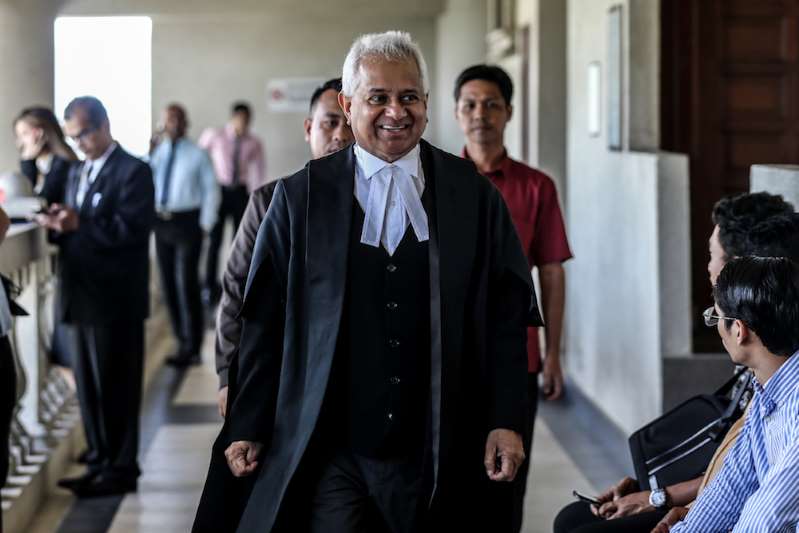Ex-director says Tommy Thomas’ memoir remarks about AIAC untrue, defamatory, in contempt of ongoing court case

© Provided by Malay Mail Tan Sri Tommy Thomas’ book ‘My Story: Justice in the Wilderness’ was released on January 30, and includes events during his tenure as Malaysia’s attorney general from June 2018 to February 2020. — Picture by Firdaus Latif
KUALA LUMPUR, Feb 3 ― Former attorney general Tan Sri Tommy Thomas’ remarks about the Asian International Arbitration Centre (AIAC) in his newly-published memoirs are untrue, the agency’s former director Datuk Sundra Rajoo Nadarajah said today.
Sundra Rajoo also said that Thomas should not have made the AIAC allegations in his book My Story: Justice in the Wilderness, when the courts have yet to decide on a matter involving the agency.
“In that chapter, he has made serious allegations against me which are untrue and defamatory.
“They are also contemptuous of the ongoing judicial review proceedings.
“His accusations against me are completely untrue, and I reserve my right to take action at an appropriate juncture,” he said in a statement.
Sundra Rajoo said the Federal Court had granted him leave to appeal the matter, with the Federal Court scheduled to hear his appeal on April 30 before a panel of seven judges.
“As such, for now, I will not make any comments on the chapter which are sub judice.
“I am confident that justice will prevail in the end,” he added.
Datuk Baljit Singh Sidhu, a lawyer representing Sundra Rajoo, had yesterday also claimed that the facts as recounted by Thomas in his book chapter on AIAC were incorrect and should not have been published while the court case is ongoing.
“Most important is that the judicial review matter is still pending in the Federal Court, to come out and say all these, it is sub judice and defamatory, as a former AG, he should have known better,” the lawyer told Malay Mail.
Thomas’ book My Story: Justice in the Wilderness was released on January 30, and includes events during his tenure as Malaysia’s attorney-general from June 2018 to February 2020.

About the court cases
On March 26, 2019, Sundra Rajoo pled not guilty at the Sessions Court to three charges of criminal breach of trust involving over RM1 million of AIAC’s funds during the December 2016 to August 2018 period, while repeatedly stressing that he is not waiving his alleged privilege of legal immunity as AIAC director during that period.
Also on March 26, 2019, High Court judge Datuk Nordin Hassan had dismissed Sundra Rajoo’s application in the civil courts for leave for judicial review, essentially disallowing Sundra Rajoo from proceeding with his legal bid to assert his purported diplomatic immunity for actions done within his official capacity and to prevent charges from being brought against him.
After the Court of Appeal in May 2019 allowed Sundra Rajoo leave to have his judicial review application heard in the civil courts, High Court judge Datuk Seri Mariana Yahya in December 2019 ruled that Sundra Rajoo has legal immunity from civil and criminal proceedings for actions done as AIAC’s director.
Ruling that the public prosecutor’s decision to charge Sundra Rajoo is subject to judicial review, Mariana had ordered the three criminal charges against him to be quashed.
In January 2020, the Sessions Court struck out the three charges of criminal breach of trust against Sundra Rajoo, as it said it was bound by the High Court’s decision that decided he had legal immunity for acts done as AIAC director.
Last June 25, the Court of Appeal overturned the High Court’s December 2019 decision that had held Sundra Rajoo to have legal immunity as AIAC director, ruling that the issue of whether he had legal immunity should be decided by the criminal courts instead of the civil courts.
On December 17, the Federal Court granted leave for Sundra Rajoo to proceed with his appeal against the Court of Appeal’s June 2020 decision.
This appeal to the Federal Court is the one that will be heard on April 30, where the court is expected to examine four questions of law, including on whether the legal immunity includes criminal proceedings, whether the attorney general’s discretion under Article 145(3) of the Federal Constitution can be subject to judicial review, and whether the High Court can in judicial review proceedings decide to quash criminal charges.




